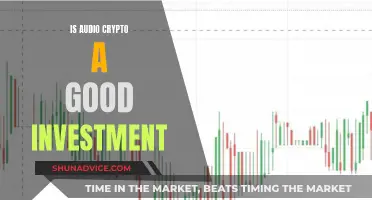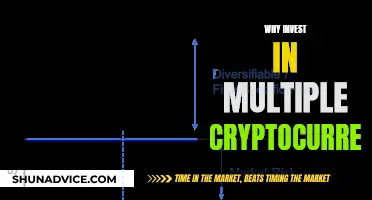
Bitcoin SV (BSV) is a form of cryptocurrency that was created in 2018 as a fork of Bitcoin Cash (BCH), which itself was a fork of the original Bitcoin (BTC). The SV stands for 'Satoshi Vision', in reference to the anonymous Bitcoin creator Satoshi Nakamoto, and was created to restore the original goal of Bitcoin, which was to be a peer-to-peer electronic form of cash. Bitcoin SV has a number of advantages, including increased scalability, lower fees, and strong developer support. However, it has also faced criticism for its controversial leadership and poor security, which has led to attacks and losses for users. So, is Bitcoin SV worth investing in?
| Characteristics | Values |
|---|---|
| Current Price | $66.39 |
| Historical Performance | Between 2016 and 2018, there were debates in the bitcoin community regarding certain technical parameters. These disagreements led to deep ideological divisions. Ultimately, several new networks were deployed to compete with the Bitcoin blockchain. |
| Pros | Huge potential for scalability, Plenty of utility with tokens, smart contracts and more, Strong developer support |
| Cons | Not listed on several exchanges, Hasn’t realized full potential, Relatively low volume, Security flaws, No relevant use-case or special attributes, Poor security record, Poor reputation, History of price underperformance compared to rivals |
| Competitive Advantage | Technology/blockchain platform |
| Contacts and Networks | Calvin Ayre and Craig S. Wright |
| Entrepreneurial Team | Craig S. Wright and Calvin Ayre |
| Industry/Technical Experience | The BSV team has the necessary hours to satisfy the criteria |
| Token Mechanics | The Bitcoin SV blockchain needs the BSV token so that it can function as a digital currency |
| User Adoption | It's difficult for the average user to understand why they should use BSV over Bitcoin |
What You'll Learn

Bitcoin SV's poor security and frequent attacks
Bitcoin SV (BSV) has faced criticism for its poor security and frequent attacks. In August 2021, the BSV blockchain suffered a 51% attack, where unknown perpetrators rolled back and altered transactions on the network to initiate three shadow chains. This was not an isolated incident, as the network had experienced similar attacks earlier in the year.
A 51% attack refers to when an attacker gains control of a majority of the hash rate, which is a measure of the energy expended by miners to protect the network. A lower hash rate means a less secure network, as it is cheaper for an attacker to gain control. BSV's hash rate has been in decline, and the network suffered multiple 51% attacks in 2021.
The consequences of these attacks can be severe. An attack on the network can result in users losing some or all of their funds. Additionally, the network experienced a 'double-spend', where a user spent the same BSV tokens twice. This further undermines confidence in the security of the network.
In response to these attacks, several crypto exchanges, including Huobi, OKEx, and Bittrex, suspended BSV transactions. The poor security and frequent attacks on the BSV network have led to concerns about its viability as a store-of-value.
While the BSV team has taken steps to address vulnerabilities, the network's history of attacks and poor security record are significant factors for investors to consider.
The Ultimate Guide to Bitcoin Investment Learning
You may want to see also

Bitcoin SV's poor reputation and leadership
Bitcoin SV (BSV) has a poor reputation in the crypto-space, which may reduce its investment potential. The project is led by Craig Wright, an Australian businessman who claims to be Satoshi Nakamoto, the inventor of Bitcoin. Wright has pursued legal action against many Bitcoin developers and investors, resulting in negative sentiment against his projects.
The de facto leader of Bitcoin SV, Craig Wright, has caused a huge rift within the blockchain community as a whole due to his claim to be Satoshi Nakamoto. This claim has never been proven, and if it remains unproven, Bitcoin SV could become despised for its aggressive and controlling behaviour. The community behind Bitcoin SV has been controversial since its inception, as they attempted to wipe out Bitcoin Cash by taking over its hash power.
Bitcoin SV is one of the more controversial coins in the cryptocurrency space, and its aggressive behaviour and poor leadership have resulted in a negative public image. The poor reputation of the project and its leaders may hamper its future price potential and reduce its investment potential.
China's Bitcoin Investment: Exploring the Mystery
You may want to see also

Bitcoin SV's low volume and lack of exchange listings
Bitcoin SV (BSV) has been delisted by several leading trading platforms, including Binance, Kraken, and Shapeshift. This is due in part to the controversial nature of the project and the actions of its key backers, Craig Wright and Calvin Ayre.
The delisting by major exchanges has impacted the liquidity and accessibility of BSV, leading to relatively low trading volumes compared to other cryptocurrencies. This low volume can be a concern for potential investors, as it may hinder their ability to easily buy or sell BSV on the market.
While BSV is still listed on some major exchanges, the lack of support from industry leaders could be seen as a red flag. It suggests that the project has failed to meet the standards or requirements of these platforms, or that there are concerns about the stability and longevity of the cryptocurrency.
Additionally, the low volume of BSV can also impact its price stability and liquidity. Low trading volume can make the price of BSV more volatile and susceptible to manipulation, as smaller trades can have a more significant impact on the market.
In conclusion, the delisting by major exchanges and the resulting low trading volume of BSV are significant factors to consider when evaluating the investment potential of Bitcoin SV. These issues may hinder the ability of investors to easily trade BSV and could impact the stability and liquidity of the cryptocurrency.
A Beginner's Guide: Investing in Bitcoin Gold in India
You may want to see also

Bitcoin SV's scalability and potential for growth
Bitcoin SV (BSV) was created to improve upon the functionality of Bitcoin. It emerged from a hard fork of the Bitcoin Cash (BCH) blockchain in 2018, which itself had forked from the BTC blockchain in 2017. The BSV blockchain's stated purpose is to become a more technologically advanced continuation of the original Bitcoin protocol, with a focus on increasing transaction speeds and scalability.
BSV has removed artificial block size limits, allowing for unbounded on-chain scaling. This means that the BSV network can scale to meet market forces and accommodate the demands of any application and payment network. In 2021, the BSV network mined the world's first gigabyte-level blocks, reaching up to 2GB in size. This is 2000 times the block size of the BTC network.
The larger block size also means that BSV can process more transactions per block, resulting in faster and cheaper transactions compared to Bitcoin. BSV reports an average of 300 transactions per second, with a peak capacity of 2,800 transactions per second on its mainnet (as of July 2020). The team behind BSV also claims that its Gigabit Testnet (GBTN) can process up to 5,500 transactions per second.
The BSV ecosystem has grown significantly since the Genesis upgrade, which removed all restrictions on the Bitcoin SV blockchain. This has attracted entrepreneurs interested in building new types of applications that are only possible through Bitcoin's unbounded scalability.
However, it is important to note that BSV has faced criticism and security concerns. Some view its large block size as a trade-off between speed and decentralisation, as fewer full nodes are able to store the entire blockchain history due to increased memory requirements. Additionally, BSV has faced questions about its security and stability, with a history of attacks and a declining hash rate.
The Ultimate Guide to Investing in Bitcoin Vault
You may want to see also

Bitcoin SV's performance against other cryptocurrencies
Bitcoin SV (BSV) emerged following a hard fork of the Bitcoin Cash (BCH) blockchain in 2018, which itself had forked from the BTC blockchain in 2017. BSV claims to fulfil the original vision of the Bitcoin protocol as a peer-to-peer electronic cash system.
BSV's performance against other cryptocurrencies has been mixed. While it appreciated 98% against Bitcoin (BTC) by January 1st, 2019, it has performed poorly against both BTC and Ether (ETH) since then. Between January 2019 and August 2021, the price of BSV increased by 58% from $88.3 to $139.3. While this sounds impressive, it has underperformed compared to other asset classes, including other cryptocurrencies. For example, BTC and ETH have gained 905% and 1,776% respectively in the same period.
BSV has also performed poorly relative to other crypto assets and asset classes over the long term. Even the S&P500 index has outperformed BSV since 2019, despite the lower risk involved in stocks.
One of the main advantages of BSV is its efficiency. BSV promotes lightning-fast, instantaneous blockchain transactions through larger block sizes. Transactions on BSV are processed with a max 4 GB block size, compared to 1 MB for BTC. This allows for more transactions to be grouped in BSV blocks, resulting in faster and cheaper transactions. It is estimated that around 260,000 transactions are processed on the BTC network per day, compared to around 3.5 million on BSV. BSV also has a much higher throughput, or power, than BTC, making it more efficient.
However, BTC is enhanced by layer-2 applications, such as the Lightning Network, which enable instant transactions at low costs. The Lightning Network also allows for micropayments and transactions across blockchains.
BSV has also suffered from security issues and frequent attacks, including a 51% attack in 2022, which briefly paralysed the network. These security concerns have impacted its performance as a store of value.
Overall, while BSV has some advantages in terms of efficiency and transaction speed, it has underperformed relative to other cryptocurrencies and asset classes, and security concerns have impacted its viability as a store of value.
The Lightning Network: Bitcoin's Future and How to Invest
You may want to see also
Frequently asked questions
Bitcoin SV (BSV) is a fork of the Bitcoin Cash blockchain and, as such, has the Bitcoin blockchain as its underlying technology. It was born out of a disagreement over the future of Bitcoin Cash in 2018.
Bitcoin SV has a much larger block size than Bitcoin (128mb compared to 1mb), which could make it more future-proof. It also has the potential to be faster and more scalable than Bitcoin and has kept fees low.
Bitcoin SV has a relatively low volume compared to Bitcoin and has not realised its full potential. It also has a controversial leadership team, which has resulted in negative sentiment towards the project.
Bitcoin SV initially performed well, appreciating 98% against Bitcoin (BTC) by January 1st, 2019. However, since then, it has performed poorly against both BTC and Ether (ETH).
No, Bitcoin SV is not a good investment. It has a history of underperformance compared to its rivals, has poor security, and has been outcompeted by stablecoins as a medium of exchange.







